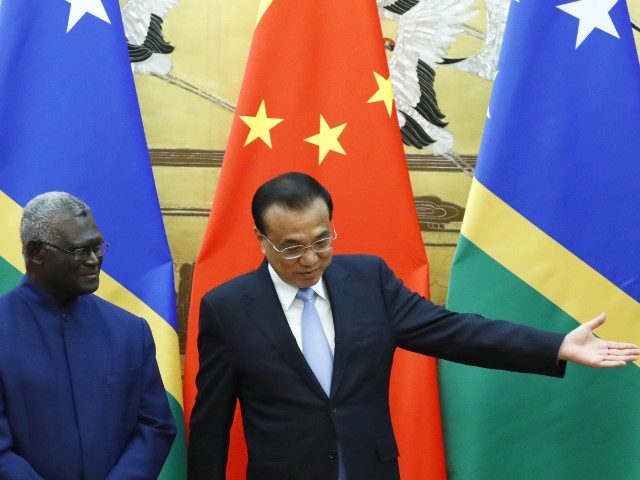The office of Solomon Islands Prime Minister Manasseh Sogavare stated on Friday that the archipelago’s new security treaty with China will not allow the Chinese to build a military base.
Reports to the contrary this week sparked a regional backlash and expressions of deep concern from Western and Asian powers.
“Government is conscious of the security ramification of hosting a military base, and it will not be careless to allow such an initiative to take place under its watch,” the statement from Sogavare’s office said.
Sogavare has not made any public statement about what the security pact with China does include and the Chinese government refuses to answer questions about it.
A draft copy of the agreement leaked last week, causing an uproar in the United States, Australia, and New Zealand by allowing China to send military personnel to the Solomons to “assist in maintaining social order,” and also refuel and resupply warships. The latter provision raised suspicions that China would construct a naval base in the Solomons.
“When they say this is not about a military port, we know that they’ve been trying to get into Papua New Guinea and elsewhere to build ports, we know that they’re already in Sri Lanka,” Australian Defense Minister Peter Dutton said on Friday.
“Every effort that we’re making at the moment is to try and deter any acts of aggression, to try and stop China heading down a path where they, you know, could deviate from a peaceful course,” Dutton said, warning China’s relentless militarization of the South China Sea could lead to a conflict like the Russian invasion of Ukraine.
“I think we need to be very cautious here because the Chinese are incredibly aggressive,” he said, hinting that Australia would increase its own military deployments if Beijing establishes a base in the Solomons.
Regional powers were disturbed by the leaked draft as well. The Federated States of Micronesia on Thursday urged the Solomons to abandon the pact, citing “grave security concerns.”
The Chinese Foreign Ministry dismissed criticism from the U.S. and its allies as “irresponsible,” but offered no details to counter their accusations.
The BBC on Tuesday portrayed the China-Solomons security pact as the final act in China’s five-year plan to woo the islands away from Australia’s sphere of influence and establish an economic, military, and intelligence foothold deep in the Pacific.
Analysts quoted by the BBC suspected Canberra was “blindsided” by the security deal, but they should have seen it coming because Beijing has been pouring money and political energy into its Solomons strategy. Alarm bells apparently did not ring in Australia until the Solomons switched its diplomatic recognition from Taiwan to China in late 2019.
Australia has a long-standing peacekeeping arrangement with the Solomons, wracked by violent factional disputes and periodic riots. For example, the most heavily populated province in the archipelago, Malaita, refused to switch diplomatic recognition to China when the central government gave the order in 2019. Sogavare has admitted this dispute was one reason riots broke out in 2021.
The Sydney Morning Herald (SMH) on Friday faulted Australia for failing to develop that peacekeeping arrangement into more substantial ties, giving China an opening to swoop in with billions of dollars in infrastructure spending, scholarship grants for relatives of Solomons government officials, and other incentives:
Australia’s careful, quiet diplomacy has for decades been predicated on giving agency to local governments while focussing on health and education programs. These are good, principled tactics, but they lack the teeth to compete with a strategic adversary. Part of this problem is structural. Beijing does not have to answer to voters about why it is spending billions on overseas infrastructure while Australian voters are unlikely to cop state-backed largesse. But this has meant that Beijing has been able to build stadiums while Australia is funding schools.
The SMH noted that the draft security deal with China was signed only a few hours after Australian High Commissioner Lachlan Strahan met with Sogavare. The Solomons prime minister evidently made no mention of the landmark balance-of-power-shifting deal to his Australian guest.
Sogavare gave a fiery speech to his parliament on Tuesday in which he denounced foreign criticism of the China security pact as “insulting” and condemned the leakers of the draft deal as “lunatics” and “agents of foreign influence.”
“We find it very insulting to be branded as unfit to manage our sovereign affairs or have other motives in pursuing our national interests,” he said.

COMMENTS
Please let us know if you're having issues with commenting.